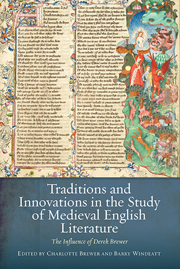 Traditions and Innovations in the Study of Medieval English Literature
Traditions and Innovations in the Study of Medieval English Literature Book contents
- Frontmatter
- Contents
- List of Contributors
- Acknowledgements
- Note on References
- Introduction: A Modern Medievalist's Career
- 1 Derek Brewer: Chaucerian Studies 1953–78
- 2 Brewer's Chaucer and the Knightly Virtues
- 3 Class Distinction and the French of England
- 4 Time in Troilus and Criseyde
- 5 Virtue, Intention and the Mind's Eye in Troilus and Criseyde
- 6 Falling in Love in the Middle Ages
- 7 The Idea of Feminine Beauty in Troilus and Criseyde, or Criseyde's Eyebrow
- 8 ‘Greater Love Hath No Man’: Friendship in Medieval English Romance
- 9 Gowerian Laughter
- 10 Derek Brewer's Romance
- 11 Malory and Late Medieval Arthurian Cycles
- 12 The Ends of Storytelling
- 13 Manuscripts, Facsimiles, Approaches to Editing
- 14 Words and Dictionaries: OED, MED and Chaucer
- 15 Afterlives: The Fabulous History of Venus
- Afterword: Derek Brewer: with ful deuout corage
- Bibliography
- Index
- Tabula in Memoriam
9 - Gowerian Laughter
Published online by Cambridge University Press: 05 September 2013
- Frontmatter
- Contents
- List of Contributors
- Acknowledgements
- Note on References
- Introduction: A Modern Medievalist's Career
- 1 Derek Brewer: Chaucerian Studies 1953–78
- 2 Brewer's Chaucer and the Knightly Virtues
- 3 Class Distinction and the French of England
- 4 Time in Troilus and Criseyde
- 5 Virtue, Intention and the Mind's Eye in Troilus and Criseyde
- 6 Falling in Love in the Middle Ages
- 7 The Idea of Feminine Beauty in Troilus and Criseyde, or Criseyde's Eyebrow
- 8 ‘Greater Love Hath No Man’: Friendship in Medieval English Romance
- 9 Gowerian Laughter
- 10 Derek Brewer's Romance
- 11 Malory and Late Medieval Arthurian Cycles
- 12 The Ends of Storytelling
- 13 Manuscripts, Facsimiles, Approaches to Editing
- 14 Words and Dictionaries: OED, MED and Chaucer
- 15 Afterlives: The Fabulous History of Venus
- Afterword: Derek Brewer: with ful deuout corage
- Bibliography
- Index
- Tabula in Memoriam
Summary
My subject is Gowerian laughter – or perhaps, for the sake of greater clarity, laughter as it appears in John Gower's poems. It's a subject that interested Derek Brewer, although he never wrote about it himself. We did discuss it, however, the last time being in New York, over lunch during the New Chaucer Society Congress in 2004, during a rambling conversation about, among other things, medieval humour in general. Unlike many committed Chaucerians, Derek had no difficulty acknowledging that Gower could be funny – intentionally funny, that is, not merely laughter's butt – or that Gower knew when he could call upon humour to further his artistic purposes (Derek found Amans, the hapless, narcissistic Lover in the Confessio amantis, to be extremely amusing, and amusing for a purpose, as do I.) But where we ended that discussion, drifting off to other topics, was with the thought that laughter in Gower's poetry was sometimes more serious, even rather darker, and due for a more careful look. Alas, neither of us got to it until now and I am grateful to the editors of this volume for providing me with the opportunity to follow through on that conversation years ago.
- Type
- Chapter
- Information
- Traditions and Innovations in the Study of Medieval English LiteratureThe Influence of Derek Brewer, pp. 144 - 153Publisher: Boydell & BrewerPrint publication year: 2013
